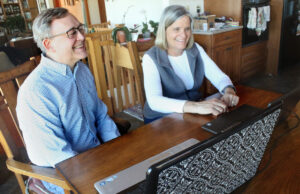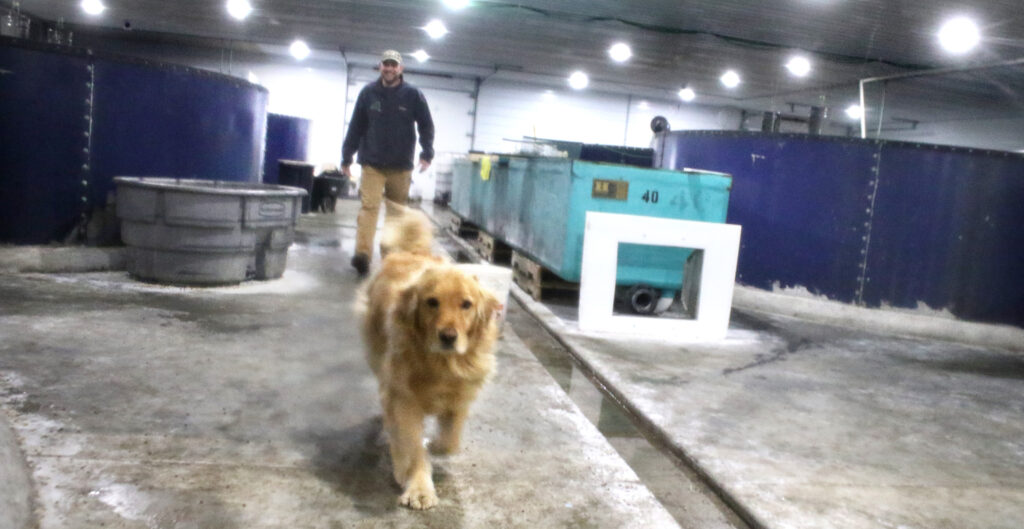$7.4M Grant Fuels
Broadband March
By JIM KEVLIN • Special to www.AllOTSEGO.com

Hickling’s Fish Farm Inc. is exactly what Otsego Electric President/CEO Tim Johnson is talking about.
In tanks inside four sizeable modern buildings on Pitts Road near here, the Hicklings are growing 65-70,000 trout yearlings annually, and another 20-30,000 pounds of 2-year-old bass, which – a delicacy in Thai and other cultures – are sold to Asian markets in Boston and other East Coast cities.
“The big money we’re spending now is in technology,” said Darren Hickling, a civil engineer who operates the business with his parents, Vincent and Linda, a nephew and one of the nephew’s high-school buddies.
With the county’s outmigration, Hickling said he can’t expand his workforce even if he wanted to: There’s no one to hire.
“It” – Broadband – “was an economic-development initiative for us,” said Johnson, who had been outside legal counsel to Otsego Electric for 25 years before becoming the top executive in 2015.
As a 501(c)(12), Otsego Electric – a cooperative founded during the Depression, owned by members to serve members – Otsego Electric is prohibited from making profits.
But “we could see the handwriting on the wall. We could see the brain-drain, the lack of opportunity to work in the rural areas,” he said. “We saw the possibility that this” – Broadband – “would stabilize our customer base.”
The strategy’s worked, for companies like Hickling’s, for realtors who can’t sell houses that don’t have access to Broadband, and for families like Johnson’s, who live in the countryside outside Edmeston.
Johnson and his wife, Vicki, an Edmeston Central school nurse, have two daughters. During the COVID pandemic, one came home from college; the other, a teacher, lives with her parents. Both used Zoom, connected via Broadband, one to learn online, the other to teach online.
Right now, Johnson and Otsego Electric are in the news, having received the latest federal grant, $7.4 million, to expand into “underserved” communities outside the cooperative’s imprint.
In the past month, Johnson’s spoken to the Otsego County board’s Intergovernmental Affairs Committee, the Friends of The Village Library (Sunday, March 21), and he’ll be featured in a Zoom in April with the Cooperstown Chamber’s “Coffee With Coop” program.
To date, the cooperative has received a total $21 million in state and federal grants to grow its Broadband network.
And it has, and how.
The cooperative had been providing dial-up Internet service for 15 years, but “we realized there was a lot of pent-up demand.” How far behind Otsego Electric had become was dramatized to Johnson while spending two years in Northern Virginia.
He returned as CEO six years ago, began pursuing grants in May 2016, and crews began stringing wire in early 2018 in 23 rural towns Otsego Electric serves, 19 in Otsego County.
Since then, the cooperative has strung 700 miles of wire past 5,000 locations; 2,700 of those locations have become Broadband customers, with packages starting as low as $49.95 a month. The high-end package is $99.95 a month.
Verizon, NYSEG and Otsego Electric use each other’s poles, which speeds things along.
Because hamlets are too densely populated, they are off-limits to the rural cooperative. But it serves rural areas in all of the county’s towns except the east end: Cherry Valley, Roseboom, Decatur
and Worcester.
It also serves two towns in Chenango County (Columbus and Unadilla Valley), part of Brookfield in Madison, and one town in Herkimer County.
Private behemoths, the Spectrums and Verizons of this world, can provide Broadband service profitably in closely settled communities – the Oneontas and Cooperstowns of this world – so they do.
The new $7.5 million enables Otsego Electric to provide service in too-rural-for-profitability areas outside its service area, the way it has within its service area. The federal government has identified such rural-enough area in the cooperative’s general vicinity.
All of this growth has raised Otsego Electric’s gross by 33 percent, Johnson said, which is plowed back into the Hartwick-based operation. The cooperative has only hired two fiber technicians and one administrator.
And, given the demand for Broadband, there’s no end in sight, Johnson said: “Biden’s going to make more funding available.”
Back on Pitts Road, Darin Hickling is conducting a tour of the operations, accompanied by his golden retriever and he walks by huge tanks holding thousands of fish.
“What Broadband has allowed us to do it be more efficient,” he said. “We have cameras in all our buildings, monitors that warn us if something goes wrong.”
He stops by the filtration system that cleans the water and returns it to the tanks.
“The filtration system can be hooked up to the Internet,” he said. “Before, we couldn’t have done any of that.”



One correction to the story… the co-op provided satellite internet, not dial-up, for 15 years. But the fiber is a big improvement…and doesn’t go out when it rains or snows!